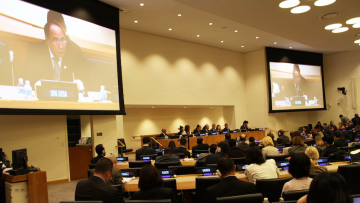
Global economic imbalances threaten sustainable development for all
The world is facing an unprecedented array of global risks and negative trends from the refugee crisis and climate change to drug-resistant antibiotics and political upheaval, renowned economist Dambisa Moyo told the UN General Assembly¡¯s Second Committee (Economic and Financial), as it began its general debate on 3 October.
Speaking on the topic ¡°One World, One Vision: Tackling Global Imbalances to Achieve the 2030 Agenda¡±, Ms. Moyo said the international community could achieve the Sustainable Development Goals, but it would be a difficult task.?¡°We have never seen this amount of geopolitical risk in one year¡±.
Adding that the world resides in a low-growth environment, she said recent reports suggest it would remain this way for years. ¡°This significantly hampers our ability to create economic growth and improve living standards.¡± Many of these concerns have now spewed into geopolitical risks, and there is a real risk that as much as 80?per cent of the world¡¯s population might be living in fragile States in the coming decades.
Ms. Moyo identified several global headwinds complicating the picture, including:? technology, which was possibly creating a jobless underclass; demographics, with a global population approaching 8?billion that would grow to 11?billion by 2100; and income inequality, which has worsened within countries even as there had been convergence between countries.
¡°I¡¯m worried about the public policy response,¡± she said.? Many countries in Africa, South America and Asia are finally agreeing that democracy and market capitalism are the fastest ways to create economic growth. But many developed countries are now turning their backs on trade, cross-border capital flows to emerging markets and free movement of people. The world today is showing it would no longer be possible to create growth with the same monetary and fiscal policies as before.
Addressing the event,?Mr. Wu Hongbo, UN DESA¡¯s Under-Secretary-General, took the opportunity to highlight that the opening of the meeting coincided with the launch of the World Economic and Social Survey 2016, which this year focuses on climate resilience as an opportunity for reducing inequalities.
 ¡°It advances our understanding of the many links between climate and development, and identifies key challenges to implementing the 2030 Agenda for Sustainable Development and related international commitments,¡± Mr. Wu said of the new Survey, published by UN DESA’s Development Policy and Analysis Division.
¡°It advances our understanding of the many links between climate and development, and identifies key challenges to implementing the 2030 Agenda for Sustainable Development and related international commitments,¡± Mr. Wu said of the new Survey, published by UN DESA’s Development Policy and Analysis Division.
Mr. Wu similarly noted that global economic growth had remained slow, with low investment and a drop in commodity prices.?Managed globalization could contribute to a more stable and prosperous future, but isolationism and protectionism are threatening the world¡¯s partnership for development.
¡°Appropriate, effective, timely and coordinated policy measures ¨C at national, regional and global levels, are needed to revive global growth and create an enabling environment for delivering on all the SDGs,¡± Mr. Wu said.
He also stressed the need to focus on the realization of the Sustainable Development Goals.?¡°This year, all attention should focus on implementation of the 2030 Agenda. The actions of all partners ¨C at the multilateral, bilateral and regional levels ¨C must be complementary,¡± he stressed.
¡°Our success will be measured by the achievements at the national level; building inclusive and prosperous societies on a healthy planet. Nothing else will count.¡±
Source: Meeting coverage of the UN Department of Public Information

Follow Us